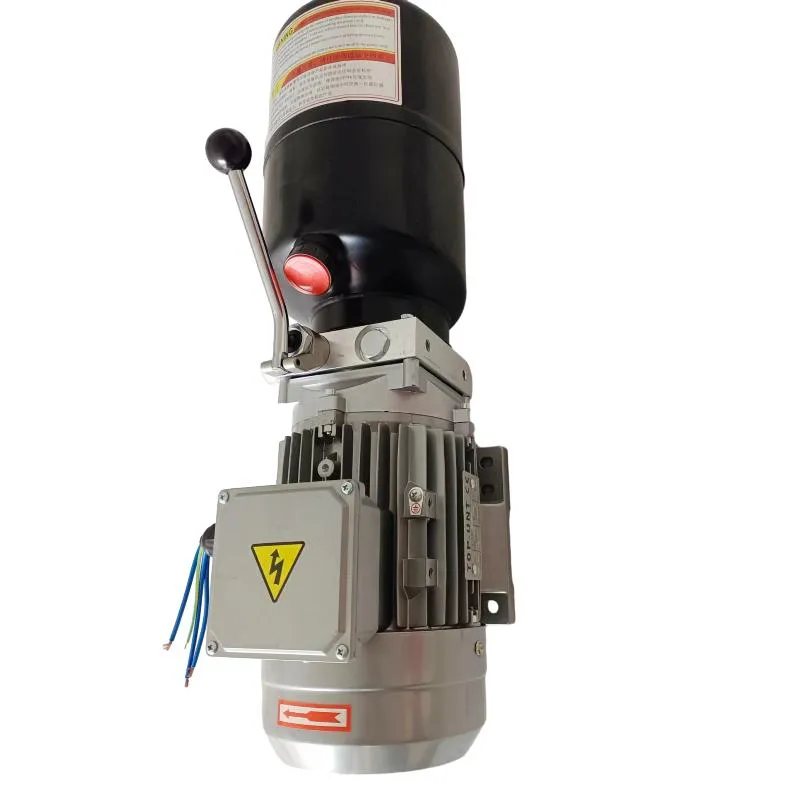Dec . 11, 2024 10:26 Back to list
Custom Hydraulic Power Unit Solutions for Enhanced Performance and Efficiency
Custom HPU Revolutionizing Hydraulic Power Solutions
In the realm of industrial applications, the need for reliable and efficient hydraulic power units (HPUs) cannot be overstated. Hydraulic systems are employed across a myriad of sectors, from construction and manufacturing to aviation and automotive industries. As the demand for specialized machinery grows, so does the necessity for custom hydraulic power units tailored to meet specific operational needs.
Understanding Hydraulic Power Units
At its core, an HPU is a device that converts mechanical energy into hydraulic energy, providing the necessary force to power hydraulic systems. Comprising a pump, motor, reservoir, and control systems, HPUs are designed to supply high-pressure hydraulic fluid, enabling the operation of hydraulic cylinders and motors. The versatility of HPUs allows them to be integrated into various machinery, enhancing their performance and efficiency.
The Importance of Customization
While standard HPUs serve various basic functions, many industries require specialized performance characteristics. Custom HPUs are engineered to meet unique specifications, ensuring optimal performance in specific operational contexts. Customization can involve adjustments to the size, power output, pressure ratings, flow rates, and even materials used in construction. This tailored approach not only improves functionality but also enhances the longevity and reliability of the machinery.
Benefits of Custom HPUs
1. Enhanced Efficiency Custom HPUs can be designed for specific applications, meaning they often operate more efficiently than their off-the-shelf counterparts. This efficiency leads to reduced energy costs and increased output in production.
2. Improved Performance Tailored solutions can increase the responsiveness and precision of hydraulic systems. This is crucial in applications that require high levels of accuracy and reliability, such as in aerospace or medical equipment manufacturing.
custom hpu hydraulic power unit

3. Space Optimization Industries often face constraints related to space. Custom HPUs can be designed to fit specific spatial requirements, allowing for better integration into existing systems without sacrificing performance.
4. Reduced Downtime Custom HPUs that meet exact specifications are less prone to failure, leading to reduced maintenance needs and less downtime. This reliability is critical in fast-paced industrial settings where time is money.
5. Scalability As businesses grow and evolve, their hydraulic needs may change. Custom HPUs can be designed with scalability in mind, allowing for upgrades and modifications as requirements shift over time.
The Design Process
Creating a custom HPU involves several steps, beginning with a thorough analysis of the application and operational requirements. Engineers collaborate closely with clients to understand their specific needs, including the type of hydraulic processes that will be used, environmental conditions, and any regulatory requirements. Using advanced design software and simulations, engineers can create a bespoke solution tailored to these parameters.
Once the design is finalized, rigorous testing is conducted to ensure the unit meets all performance standards. This phase may include pressure testing, flow rate assessments, and efficiency evaluations. The end result is a custom HPU that not only meets but exceeds the client’s expectations.
Conclusion
In today’s competitive industrial landscape, the demand for customized solutions continues to rise. Custom hydraulic power units represent a future where efficiency, reliability, and precision are paramount. By investing in tailored HPUs, companies can optimize their operations, enhance productivity, and ultimately achieve their business goals. As technology advances, the possibilities for innovation in the field of hydraulic systems remain vast, promising exciting developments for industries worldwide.
-
1.5 Ton Flipping Oil Cylinder 70/82-40-217-720-Hebei Shenghan Hydraulic Machinery|Precision Hydraulic Cylinder,Custom Hydraulic Solutions
NewsAug.29,2025
-
1.5 Ton Flipping Oil Cylinder 70/82-40-217-720 | Hebei Shenghan Hydraulic Machinery Co., Ltd.
NewsAug.29,2025
-
High-Precision [90/105-50-180-480] Industrial Component | Durable & Reliable
NewsAug.27,2025
-
High-Performance Set of 50/60-45-290 471 | Durable & Reliable Components
NewsAug.26,2025
-
Efficient Pallet Truck Power Units - Reliable Hydraulic Systems
NewsAug.25,2025
-
Premium Set of 50/60-45-290 471 Parts | High Performance
NewsAug.24,2025
